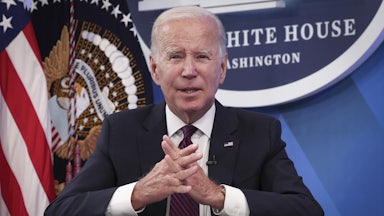On Tuesday, Lindsey Graham stood before reporters and gave the game away. Only four months earlier—not long after Alito’s draft decision in Dobbs v. Jackson Women’s Health Organization leaked—the South Carolina Republican had insisted that abortion policy should be left to states. Now, with less than two months until the midterm elections, Graham has other ideas: He’s pushing a bill that would enforce a nationwide ban on abortion after 15 weeks.
Lest you think Graham didn’t intend this to be a midterm election matter, we have his own statements on the subject in the public record. Should the Republican Party “take back the House and the Senate, I can assure you we’ll have a vote on our bill,” he said. So there you have it: When the Republican Party retakes power, it will swiftly move to pass a nationwide abortion ban. So much for all that “let the states decide” stuff. But you could tell that his Republican colleagues weren’t quite ready for one of their own to just say all of that out loud by their responses—the Capitol Hill equivalent of tugging at their shirt collars and staring at the ground.
Ever since Politico published Alito’s draft opinion, Democrats have been reminding voters that the GOP’s end game is a nationwide ban on abortion (and perhaps contraception as well). Republicans have responded with the silence of those who would prefer the conversation might die out—many, particularly those in close races, have not only stopped talking about the issue but have scrubbed their unpopular positions from their campaign websites altogether. And since the Supreme Court issued its ruling in Dobbs, Democrats have been surging in the polls, thanks in large part to voters recoiling from the Republican Party’s draconian position on abortion. Graham’s decision to blunder onto the scene with an abortion ban of his own couldn’t have come at a worse time for vulnerable Republicans in blue and purple states.
Naturally, the reaction in some far-flung corners of the punditocracy was to make the blanket assumption that Graham was doing shrewd politics. Most voters favor abortion, but many do so with some restrictions in mind. Graham, according to this line of thought, was simply resolving a dispute with a more palatable solution that’s in line with what most voters believe, in the hopes of getting their minds off the hefty, high-test dose of the Republican vision of reproductive freedom to which they’ve been treated—a horror show in which Republicans’ beloved abortion bans have led to dreadful outcomes, such as forcing preteen rape victims to travel out of state to receive urgent medical care.
“Graham is hoping to give Republicans a positive talking point on the abortion issue—something his side can point to as evidence that they are not the intolerant ogres that Democrats have, to date, effectively cast them as in the wake of the Supreme Court decision,” wrote CNN’s resident conventional wisdom–generating android Chris Cillizza. In this line of thinking, the move was desperate but clever: Give Republicans an abortion policy that they badly need—and that voters may find lines up with their own viewpoints.
There are a few problems with this theory, however, beginning with the fact that the Republican Party has already roundly rejected it. Texas Republican Senator John Cornyn suggested that Graham was acting alone—and recklessly. “That wasn’t a conference decision. It was an individual senator’s decision,” he said. Mitch McConnell, meanwhile, reacted by basically telling Graham to remember the real talking points—which were Graham’s in May. Most senators, he told reporters, “prefer this be handled at the state level.” It was clear why Republican senators were mad at Graham. Contra Cillizza, he was making things worse for Republicans—particularly those running in states that hadn’t yet passed restrictions on abortion.
Naturally, you should absolutely expect Republicans to try to ban abortion when they retake Congress. The party didn’t spend all this effort and money to engineer the Supreme Court’s 6–3 conservative majority to leave some vestige of Roe’s broad protections alive in Democratic-controlled states, where a majority of voters would protect reproductive freedom. The only question will be how much of a ban they’ll impose. As Slate’s Jim Newell argued, the most likely result will be a brutal test of conservative purity: “The 2024 Republican presidential primary … could quickly become a race-to-the-bottom on the issue. A 15-week national ban? RINO. Let’s make it six. A 6-week ban? RINO! Let’s make it zero. Exceptions? R-I-N-O.”
So yes, Graham’s bill looks more moderate than where Republicans will likely end up, but it nevertheless makes clear the end goal: a nationwide abortion ban, specifically imposed on states whose residents would, left to their own voting majorities, protect those rights. Graham’s move is, in context of the midterms, very bad politics. He’s causing unnecessary intraparty friction for a Republican Party that’s currently struggling to revive its midterm prospects. But bad politics or not, this is the Republican Party’s position: Voters in some states, left to their own devices, are likely to preserve the broader reproductive freedom they enjoyed during the Roe era’s status quo, so a nationwide ban to thwart their will is coming. Lindsey Graham will simply be remembered for being no master of timing.










